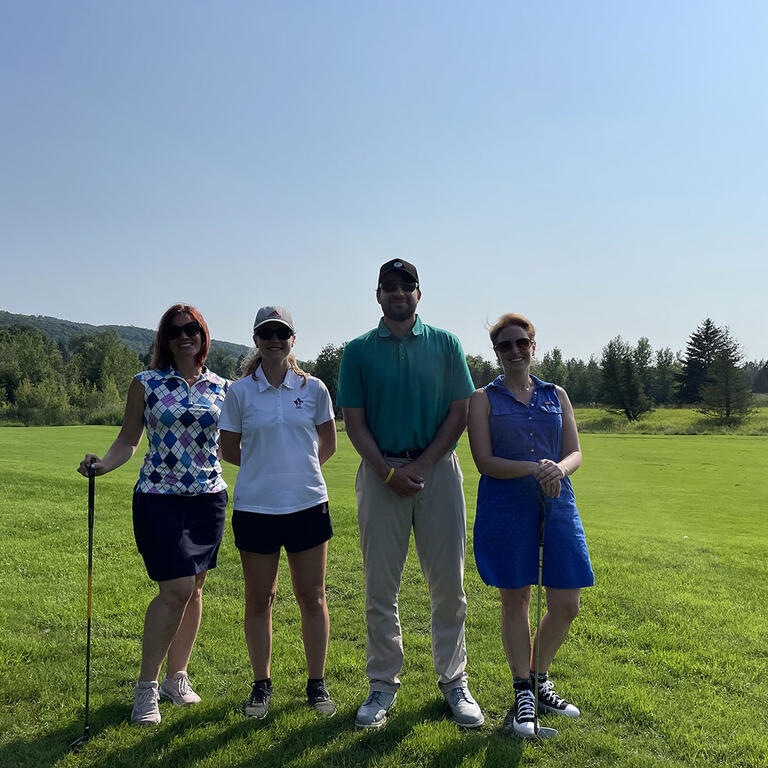
Femmes sur le terrain,” the first joint initiative between Videotron Business and Desjardins as part of Omnium du Québec 2023, has been a real hit. The event underscores the aim of the telecommunications provider to promote female leadership within Québec companies. It’s the kickoff to a long journey towards recognizing women’s contributions to the working world, despite the headwinds they have faced.
Videotron Business and all of Quebecor’s subsidiaries are constantly striving to highlight women’s roles within Québec companies. This desire ignited the idea to organize a golf tournament exclusively for businesswomen, especially given the fact that such events are all too often the exclusive reserve of men. “Bye-bye boys’ club!”
The event brings together managers, clients, account directors, and ambassadors for the #leadershipfeminin program at Pôle sports HEC Montréal. After an introductory workshop to the game of golf, and a session in which players were paired with a professional on the course, a networking cocktail was held on the patio outside the Domaine Château-Bromont.
A number of well-known figures were in attendance to ensure the success of the event. A special mention must be given to events agency DOVIO as well as DJs Lucas and Alex, who joined forces to lend a warm and welcoming ambience to the evening. Three inspiring women gave talks during the cocktail hour. Here’s a rundown of what they shared with the audience.
Danièle Sauvageau Associated Director of Pôle sports HEC Montréal
Danièle Sauvageau needs no introduction. Well known in the world of Canadian women’s hockey, she has continued her career in a number of areas. For her talk during the “Femmes sur le terrain” event, Ms. Sauvageau shared a rather revealing anecdote.
“When I was young, I played hockey with my two brothers. And we would have the same argument at every Christmas dinner. I really believe that I was actually better than they were! But when I went with them to the arena at Saint-Eustache, the man who met us said, ‘They can play, but not you.’ So I asked what I could do to help out. I started by refilling water bottles, and later I was able to participate in supervising training sessions.”
That’s when her career as a coach first started. “I went to the Olympic Games ten times,” she states proudly. But she also admits that the word “no” really upsets her. “Women’s leadership is the instinct to offer another woman what we did not necessarily have ourselves. And you have to remember that the word ‘no’ contains the letters ‘n’ and ‘o,’ for ‘new opportunity,’” she wisely pointed out.
Roxanne Doucet Vice-President, Human Resources, Quebecor
To say that this was an important event for Roxanne Doucet would be an understatement. In addition to participating in “Femmes sur le terrain,” she was officially named Vice-President at Quebecor. “This is a big day in my career,” she admitted.
When she started in her first management position, Ms. Doucet was surrounded by a lot of male role models. She believed she could do what they did. “Since then, I have realized that I had given up my capacity for emotion. At that time, it was considered a negative quality and the domain of women. Today, I accept my emotions and the fact that I’m a passionate person. Passion is what makes me an excellent manager. And my capacities for patience and warmth, both those qualities have made me a leader,” she explains.
She reminded the audience that women are united by big strengths. “It’s by helping each other that we’ll succeed in building women’s leadership. I encourage you to give back and extend a hand to another woman in your professional circle to help them succeed in their career,” she concluded.

Khadija Azizi Vice-President and Regional Director, Desjardins
Khadija Azizi grew up surrounded by men. “I come from a family where women are rare,” she said. She was therefore raised the same way as her six brothers. “However, my father never took me hunting. It wasn’t because he didn’t want to spend time with me, but instead because social biases dictated what we could or could not do together,” she stated with confidence. So since hunting was off-limits to her, she tried another tack. “I learned to drive a tractor when I was eight, like my brothers,” she said, laughing.
Ms. Azizi insisted on the importance of having a mentor. She herself benefited from help from two more experienced women: Isabelle Hudon and Sophie Brochu. “They taught me that balance isn’t something you achieve every day. It’s a moving target that changes depending on your needs. The important thing is to adapt. Sometimes you need to work more at the office and spend less time with family. Other times it’s the reverse, and it’s time to put more emphasis on your personal life,” she explained, sharing her own experience with the audience.
An overview of the situation
The Canadian Women’s Foundation states that “women make up slightly more than half the population of Canada, yet they are still underrepresented in political and professional leadership positions.” A number of statistics shed more light on the situation.
According to Statistics Canada, women represent only 29% of Canadian Chamber of Commerce members as of July 2021. And according to this same source, women hold 35.6% of management positions and 30.9% of upper management positions. Lastly, only 4% of the largest Canadian publicly traded companies have a woman as a CEO, as per data compiled by The Globe and Mail.
In a study entitled “Diversity Wins: How Inclusion Matters,” published by McKinsey & Company in May 2020, the authors arrive at a highly interesting conclusion. “Companies with higher levels of ethnic, cultural, and gender diversity are more likely to achieve higher profitability than less diverse competitors,” they write. Companies are now able to offer the Women Leaders Program to employees who would like to advance their careers at their organization.
As mentioned by Khadija Azizi during her talk, women leaders can also serve as role models and mentors for young women. A study conducted by KPMG showed that 67% of women considered their most important leadership lessons to have resulted from contact with other women.
The idea of mutual assistance therefore seems central to women’s leadership. The effect of following in others’ footsteps is also evident, with 86% of women confirming that seeing a greater number of women in leadership positions led them to believe that they also could achieve those roles.

Sports is part of the trend
During the cocktail, Danièle Sauvageau mentioned that women in sports are also facing their own challenges. “In terms of quitting sports, we see this most with women. The sports industry needs women, and not just as participants, but also in executive roles,” she stated. For this inspiring woman, every person needs to find their own place. “We need advocates, men who will make room for the potential and power of women.”
While many obstacles remain for women in sports, there are signs that things are improving. While women generally earn less than their male co-workers despite performing similar work, parity in terms of prize money for the smaller competitions, in women’s tennis and other sports, has just been instated. Starting in 2027, 1000- and 500-category women’s tournaments, the most prestigious after those for the Grand Slam, will offer prize money that is the same for women and men. Congratulations on winning another set, ladies!
So what about golf? “Women bring a lot to our sport. They’re ambitious and dynamic, and are interested in mastering the basics in order to appreciate the game more. They are in a position to get their family, friends, and co-workers involved. We’ve observed that they are great promoters,” explains Sébastien Néron, a golf professional and teacher at PGA Canada.
The private company may be interested in investing in all-women activities in the near future. “These activities promote collaboration and teamwork and are a considerable source of inspiration for this clientele,” states the expert.
Athletes and managers: parallel worlds
The talks by Danièle Sauvageau, Roxanne Doucet, and Khadija Azizi also drew parallels between the world of sports and women’s leadership. While athletes need to display determination and resilience to overcome obstacles, women leaders are also often called to overcome extra challenges related to gender stereotypes and societal expectations to reach higher positions within an organization.
Team spirit is another element they have in common. Every athlete contributes to a group effort to win a trophy, and similarly women leaders promote collaboration and inclusion by encouraging a diversity of points of view to achieve optimal results. Lastly, great athletes and great managers both have the capacity to inspire future generations. To all the women who have demonstrated great leadership, Videotron Business would like to say a heartfelt “Thank you!”
11 august 2023, Par Videotron Business






